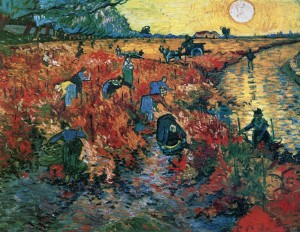Isaiah 5:1-17
This text is used for the Lectionary Year C on August 14, 2016.

Isaiah sings for his beloved. His beloved is the Lord. Consistent to Isaiah, he does not speak as himself or for himself, but as the Lord, for the Lord. In this regard, Isaiah has more speech on behalf of the Lord than either Jeremiah or Ezekiel; as in Isaiah 30:1, where he expresses a deep woe for the Lord about the stubborn sons and daughters bearing witness to the word of the Lord.
In this fashion Isaiah sings to the beloved while being overheard in the camp of the rebellious. The song is a lament by the God who so hurt in his heart (borrowing a frequently used Native American expression for our creator’s deep love in sending his son to die for us). Singing a love song Isaiah expresses the disappointment of the Lord. Their disenchantment brings a stiff word of judgment upon the people. Hear the sound of this song in its reading. It sounds like the deep cords of a cello echoing from a heart that has been broken. As part of your worship the reading of this text could very well be followed by the playing of a deeply sad but lovely lament on the cello offering a time of confession. When the beauty of God’s heart is revealed we can be empowered to muster the courage that is required to make confession.
This is a song regarding the beloved’s vineyard; a vineyard planted on the best of land, a fruitful slope that inspired the planting of the choicest vines. Hard work went into digging up and spading the ground and clearing it of stones. It was a labor of love. The scorching sun that beat down during this tedious toil is the same sun that will warmly nurture the growth of the vines.
When the finest of red vines had been planted, a trench was made to go around them. Then the beloved expressed anticipatory care. A look-out tower was built in the center of them all. Part of the preparation given for the garden’s success was in the anticipation of its care and protection. How then must we live our lives when we consider the investment God has made on our behalf? It may be for this very day that God has intended for us to live fully and faithfully. God’s protection and provision are our deep resources. We must value the resources we have been given.
With a sense of real anticipation for the harvest to come, the beloved gardener cut out a vat for pressing out the wine. Life is gifted in just that way. The context of our day has been shaped so that the life in us may be pressed into useful service. Our lives must be faithfully harvested and refined. God desires to bring forth the best in us. The care that has been given is the care that we must offer. Best location. Tireless preparation. Most choice vines. Highest of expectations all are to be brought into service.
And the beloved watched, fully expecting these vines to yield the finest of grapes. He looked eagerly and tenderly for them to bear good grapes! Yet, they bore instead the wildest of grapes. Speaking to the chief priests and scribes, the custodians of the temple, Jesus used this parable of the vineyard as the basis for his own (Mark 12:9). It is with courage that he says the finest on the vines have not produced a product worthy of their hire. Judgment is clear. It is evaluative. It gives reason for us to give pause to consider what is being produced in us for the sake of God’s kingdom! “Look, behold what manner of love that God has bestowed upon us that we should be called the children of God. And such we are!” (I John 3:1-3). How do we compare? Good grapes or wild ones?
The beloved inquires with a perfect unwavering pitch. “Judge between me and my vineyard.” It is like a county fair! The value is based upon comparison. The weight or value is made apparent. The argument is self-evident. “What more was there to do for my vineyard that I have not done in it?” (5:4). It is a brave question asked by the One who gives the most. “What more?” Our church culture today appears to feel that something more is what is always needed. It assumes we are found not faithful because not enough has been done or been given. Perhaps church could best be served by taking good inventory of all that God has done and all that God is doing on behalf of our world. Without question, enough has already been given.
And yet, the grapes are nasty. They are lacking. These wild grapes result in the removal of the hedge and the breakdown of the wall. What once was a garden shall be turned to a pasture to be trampled. Harsh. Severe. Inevitable. “I will make it a waste.” (5:6). And bring further judgment. “I will bid the clouds drop no rain on it.” (5:6). Provision shall wither. Less is the outcome.
This is the story of God’s people. They are the vineyard. Israel and Judah are his desired acreage. “He had every reason to expect justice but saw bloodshed; righteousness but heard a cry!” (5:7) This message of judgment is phrased in romantic poetry. A vine once had flourished is now ravaged. It took real work to get that way. Neglect turns to regret. Regret to real loss. This is a clear call for our community of faith when we are not aware of the gracious and sustaining desires of God’s heart. Lest we forget.
 Stephen D. Graham
Stephen D. Graham
Coordinator
CBF Oklahoma
sgraham@cbfok.org
Tags: God’s provision, theology of enough, sing me a love song, jog my memory, call for confession, wild grapes, beloved community
